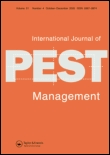
INTERNATIONAL JOURNAL OF PEST MANAGEMENT
Scope & Guideline
Exploring the intersection of science and agriculture for effective pest control.
Introduction
Aims and Scopes
- Integrated Pest Management (IPM) Strategies:
The journal covers research on IPM methods that combine cultural, biological, and chemical control approaches to manage pest populations effectively while minimizing environmental impact. - Biological Control Agents:
Studies on the use of natural predators, parasitoids, and pathogens to control pest species are a significant focus, highlighting the potential of biocontrol agents in sustainable agriculture. - Pesticide Resistance and Management:
Research addressing the mechanisms of pesticide resistance in pest populations and strategies to mitigate resistance development is an important area, reflecting the ongoing challenges in pest management. - Ecological and Environmental Impacts:
The journal publishes articles that explore the ecological consequences of pest management practices, including effects on non-target organisms and overall ecosystem health. - Innovative Control Techniques:
Emerging technologies and methodologies for pest control, such as nanotechnology, biopesticides, and novel application techniques, are highlighted as part of the journal's commitment to advancing pest management science.
Trending and Emerging
- Sustainable and Eco-Friendly Practices:
An increasing number of studies focus on sustainable pest management practices, including organic farming, the use of biopesticides, and ecological approaches that reduce reliance on chemical inputs. - Impact of Climate Change on Pest Dynamics:
Research examining how climate change affects pest populations, their distribution, and management strategies is gaining prominence, reflecting the urgent need to adapt to changing environmental conditions. - Invasive Pest Species Management:
With the rise of invasive pests globally, there is a growing body of research focused on understanding and managing these species, emphasizing the need for effective control strategies. - Advancements in Biotechnology:
The use of genetic and biotechnological methods for pest management, including the development of genetically modified organisms (GMOs) and gene editing technologies, is increasingly featured in recent publications. - Stakeholder Perspectives and Adoption of IPM:
Studies exploring farmer perceptions, knowledge, and behaviors regarding IPM adoption are trending, providing insights into the social dimensions of pest management and the barriers to implementing sustainable practices.
Declining or Waning
- Traditional Chemical Pesticides:
Research focused solely on conventional synthetic pesticides is decreasing as the emphasis shifts towards integrated and ecological approaches to pest management. - Single-Species Pest Studies:
There is a waning interest in studies that focus exclusively on single species of pests without considering broader ecological interactions or integrated management strategies. - Chemical Resistance Mechanisms:
While resistance is a critical topic, studies solely detailing resistance mechanisms without exploring practical management solutions are less frequently published.
Similar Journals
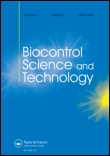
BIOCONTROL SCIENCE AND TECHNOLOGY
Driving Excellence in Biocontrol Research and TechnologyBIOCONTROL SCIENCE AND TECHNOLOGY is a premier, peer-reviewed journal published by Taylor & Francis Ltd that specializes in the dynamic fields of Agronomy and Insect Science. Established in 1991, this journal has garnered a reputation for disseminating high-quality, impactful research with an impressive 2023 Scopus rank of 53 out of 181 in Insect Science and 153 out of 406 in Agronomy, placing it in the Q2 category for both fields. With its ISSN 0958-3157 and E-ISSN 1360-0478, the journal serves as a vital resource for researchers, professionals, and students dedicated to advancing understanding and innovation in pest management and biocontrol strategies. Although not an open-access journal, it offers comprehensive insights that are crucial for professionals aiming to tackle agricultural challenges and enhance food security. The journal’s continuous coverage from 1991 to 2024 ensures that it remains at the forefront of significant advancements in biocontrol, making it an essential read for anyone interested in sustainable agricultural practices and integrated pest management.
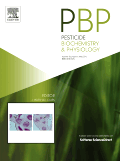
Pesticide Biochemistry and Physiology
Championing high-quality research for food security and environmental safety.Pesticide Biochemistry and Physiology, published by Academic Press Inc Elsevier Science, is a prominent peer-reviewed journal dedicated to advancing knowledge in the fields of agronomy, crop science, and the toxicological effects of pesticides. With an established history since 1971, this journal aims to provide a platform for researchers and professionals to share groundbreaking studies that bridge the gap between agricultural practices and environmental health. Holding a remarkable Q1 ranking in both Agronomy and Crop Science as well as Health, Toxicology, and Mutagenesis, it reflects the journal's commitment to high-quality research. The journal is essential reading for anyone involved in the sustainability of agricultural ecosystems, offering insights into the biochemical interactions of pesticides and their physiological impacts on various crops and non-target organisms. As the global demand for sustainable agricultural practices escalates, Pesticide Biochemistry and Physiology remains at the forefront, promoting innovative research to ensure both food security and environmental safety. Converged through an extensive range of studies, this journal is a valuable resource for researchers, professionals, and students aiming to make significant contributions to the evolving landscape of pesticide biochemistry.
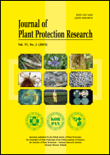
JOURNAL OF PLANT PROTECTION RESEARCH
Enhancing agricultural practices through rigorous research.JOURNAL OF PLANT PROTECTION RESEARCH is a pivotal publication in the realm of agricultural sciences, dedicated to advancing our understanding of plant protection and pest management. Published by the INST OCHRONY ROSLIN, PANSTWOWY INST BADAWCZY in Poland, this journal has been an open-access venue since 2008, ensuring that research findings are readily accessible to a global audience. With an ISSN of 1427-4345 and E-ISSN of 1899-007X, it serves as a crucial platform for scholars and practitioners in the fields of Agronomy, Plant Science, and Soil Science. In the latest categorizations, it has achieved a Q3 ranking in these disciplines, reflecting its impact and significance within the scientific community. As the journal converges its scope from 2008 to 2024, it continues to address pressing issues in plant health and sustainability. Its strategic placement within the Scopus ranks offers valuable insights into agricultural and biological sciences, making it an essential read for those seeking to enhance their expertise in plant protection strategies.
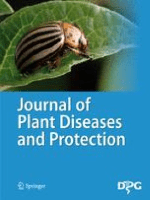
Journal of Plant Diseases and Protection
Advancing the Science of Plant HealthThe Journal of Plant Diseases and Protection, published by SPRINGER HEIDELBERG in Germany, is a premier platform for the dissemination of cutting-edge research in the fields of Agronomy, Horticulture, and Plant Science. With its Q2 ranking in multiple categories as of 2023, this journal stands out in the academic landscape, highlighting its strong performance with a notable Scopus rank of 22nd in Horticulture and placing in the top percentile for Agronomy and Plant Science. The journal spans from 2006 to 2024, making it a valuable resource for researchers, professionals, and students seeking to stay abreast of advancements in the understanding of plant diseases and their protection. The Open Access options further enhance its accessibility, fostering a global exchange of knowledge essential for addressing contemporary agricultural challenges.

INDIAN JOURNAL OF AGRICULTURAL SCIENCES
Nurturing insights for a greener tomorrow.Welcome to the Indian Journal of Agricultural Sciences, a vital resource for researchers and professionals in the field of agricultural sciences, published by the esteemed Indian Council of Agricultural Research. Established in 1974, this journal aims to disseminate high-quality research and developments in agronomy and crop science, facilitating knowledge exchange and advancement within the agricultural community. Though currently classified in the Q4 category according to 2023 data, it provides an essential platform for publication, contributing valuable insights towards sustainable agricultural practices. With an ISSN of 0019-5022 and an E-ISSN of 2394-3319, the journal houses important research that spans decades of convergence and collaboration, promoting innovation in agriculture across India and beyond. As an open access platform, it invites contributions that reflect a wide array of agricultural disciplines to foster sustainable food systems that address the challenges of food security. Join the network of scholars and practitioners by sharing your research and engaging with the profound work being done in this transformative field.
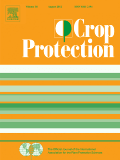
Crop Protection
Advancing sustainable solutions for global agriculture.Crop Protection is a leading academic journal in the field of Agronomy and Crop Science, published by Elsevier Science Ltd, and recognized for its high impact demonstrated by an impressive Q1 quartile ranking in 2023. With its ISSN 0261-2194 and E-ISSN 1873-6904, this esteemed publication has been a crucial source of research since its inception in 1982, continuing to provide valuable insights and advancements in crop protection strategies through 2024. The journal serves a diverse audience, including researchers, professionals, and students, eager to explore pioneering findings in pest management, herbicide development, and sustainable agricultural practices. While the journal does not offer open access options, its rigorous peer-review process ensures the highest quality of scholarly articles that contribute significantly to the agricultural and biological sciences, maintaining its respected position with a Scopus rank of #63 out of 406 in its category, placing it in the 84th percentile. Engaging with Crop Protection not only enriches knowledge but also promotes innovative solutions for global agricultural challenges.
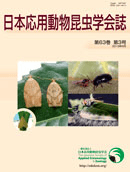
JAPANESE JOURNAL OF APPLIED ENTOMOLOGY AND ZOOLOGY
Diving Deep into the World of Insects and BiodiversityJapanese Journal of Applied Entomology and Zoology is a premier publication in the field of Insect Science, offering a platform for researchers and practitioners to share their findings on applied entomology and zoology. Established in 1957 and published by the Japan Society of Applied Entomology and Zoology, this journal aims to foster the understanding of insect-related studies that impact agriculture, ecology, and biodiversity. With an ISSN of 0021-4914 and E-ISSN of 1347-6068, it serves as a crucial resource for both academics and industry professionals. While the journal currently resides in the Q4 category of the Scopus ranking for Insect Science with a percentile of 11th, it plays a significant role in providing valuable insights into insect behavior, systematics, and their ecological roles. Readers can benefit from its published research to drive innovations and solutions in pest management and conservation practices. As the journal continues to evolve, it reinforces its commitment to disseminating critical research that supports sustainable practices in entomology and zoology through its convergence extending to the year 2024.
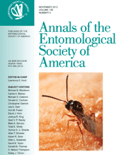
ANNALS OF THE ENTOMOLOGICAL SOCIETY OF AMERICA
Innovating Insights into the World of InsectsANNALS OF THE ENTOMOLOGICAL SOCIETY OF AMERICA is a premier journal dedicated to advancing the field of insect science, published by Oxford University Press. With an impressive impact factor and classified in the Q1 quartile for its category, this journal ranks among the top publications in agricultural and biological sciences, specifically within insect science, positioned at #28 out of 181, indicating its significant influence and high-quality research contributions. The journal aims to disseminate original research, comprehensive reviews, and groundbreaking findings that enhance our understanding of entomology, spanning across ecological, evolutionary, and applied segments. With a consistent publication history since 1938, researchers, professionals, and students will benefit from the wealth of knowledge presented in its pages. Although the journal does not currently offer open access, it remains a vital resource for those seeking to stay at the forefront of entomological research and innovation.

Journal of Integrated Pest Management
Fostering collaboration across agronomy and insect science.Welcome to the Journal of Integrated Pest Management, a premier open-access publication dedicated to advancing the science and practice of integrated pest management (IPM). Published by Oxford University Press Inc. since 2010, this journal has established itself as a vital resource for researchers and professionals in the fields of Agronomy, Insect Science, Plant Science, and Management, Monitoring, Policy and Law. With a commendable impact in its category, including a prestigious Q1 ranking in Agronomy and Insect Science and a Q2 ranking in relevant management fields, it holds a significant position in fostering innovative approaches to pest management. The journal is accessible to a global audience, thanks to its open-access model, ensuring that the latest research and insights can be shared freely among scholars, practitioners, and students alike. Spanning from 2010 to 2024, the Journal of Integrated Pest Management promotes interdisciplinary discussion and practical solutions aimed at enhancing agricultural sustainability and pest control strategies worldwide.

Pesquisa Agropecuaria Tropical
Exploring the forefront of agronomic research.pesquisa Agropecuaria Tropical is a premier Open Access journal dedicated to advancing the knowledge and practices within the field of agronomy and crop science. Since its inception in 1971, this peer-reviewed journal, published by the Universidade Federal de Goiás, has played a pivotal role in disseminating high-quality research from Brazil and beyond. Operating under an Open Access model, it ensures that scholarly articles are freely accessible, thereby fostering greater collaboration and innovation. With a Scopus ranking placing it in the 32nd percentile among its peers in agricultural and biological sciences, and a current classification in the Q3 category of agronomy and crop science, the journal serves as an essential resource for researchers, professionals, and students alike. As it continues its publication journey from 2010 to 2024, it remains committed to contributing valuable insights and advancements in the agricultural sector, ultimately influencing sustainable practices and food security.